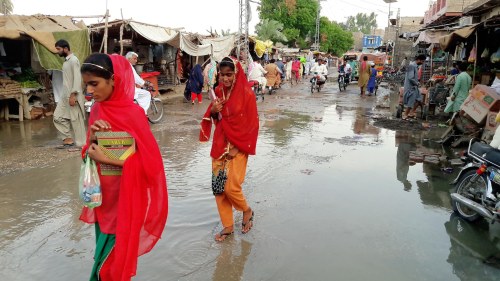Cities Are Stepping up on Climate Action as Nation States Fall to the Wayside

Cities must step up when nation-states ignore the devastating impacts and economic costs of climate change, sea level rise, and environmental degradation.
Climate change threatens the very basis of human survival everywhere—from nation-states to cities. Yet in spite of the devastating impacts and economic costs of global warming, sea level rise, and contamination of air, water, and soil, national authorities are reluctantly mitigating and adapting to these threats. This is because national politicians face few penalties for inaction and even fewer rewards for taking assertive action. Take the case of the United States, a country responsible for 20 percent of all global greenhouse gas emissions, which is led by a president and party that believes climate change is a hoax.
This is not to say that nation-states have completely absconded from taking action to arrest climate change. In 2015, after twenty years of stop-start negotiations, over 170 members of the United Nations agreed to a non-binding agreement to limit temperature rises above 2C. Although some climate scientists felt the agreement fell far short of what was needed to turn things around, the so-called Paris Agreement represents the best deal that diplomats could cobble together. In 2017 the agreement was dealt a blow: President Trump announced the US withdrawal from the new treaty, claiming it was unfair to US business.
When nation-states like the US default on their sovereign responsibilities to protect current and future citizens, cities have an obligation to step up. There are signs that cities around the world are finding their voice. Within days of the US exiting from the Paris Climate Agreement, more than 385 "climate mayors" representing 68 million Americans re-affirmed their commitment to key targets. Meanwhile, in Europe, over 7,500 cities endorsed a Covenant of Mayors for Climate and Energy. This translates into 250 million Europeans committed to reducing CO2 emissions by at least 40% before 2030.
As the North American Climate Summit in Chicago this week shows, cities do not need to wait and ask permission to take action. Mayors simply can´t afford to be complacent since they are literally on the front lines. They are already engaging citizens directly, supporting integrated public transport, recycling, clean energy projects, and much more. These measures not only reduce emissions, limit congestion and improve health, they also increase the overall livability of cities. But to really step-up their game, cities must pool their resources and work in alliances. The good news is that many of them already are: there over 200 inter-city networks around the world, many of them focused on climate change.
A Global Parliament of Mayors was launched in 2016 precisely to empower cities to assume greater leadership and speak with a common voice. More than 70 mayors from around the world have signed up to join forces on climate action, supporting migrants and strengthening local governance. The Global Parliament even met in Chicago earlier this year to support efforts to promote sanctuary for undocumented migrants. While it is still early days, the Parliament could serve as a potent force at a time when the United Nations Security Council, the General Assembly, and national governments are unable or unwilling to address the most extreme global challenges.
The Global Parliament of Mayors is designed to empower mayors to do what they do best: take action. It gives them a voice and a seat at the decision-making table. It also provides them with a vote on an emerging urban agenda. Nation states still resist giving cities more say in global affairs — a situation that is no longer acceptable given the latter’s ascendance. The Parliament also strengthens cities’ capacities to veto decisions that run contrary to the urban imperative, especially in those parts of the developing world where cities are weakest and most fragile.
Cities are already taking the lead on some of the most pressing issues of our time. While there are no simple answers to the world’s most intractable problems, the fight for clean energy, equality, security, justice and sustainable development will take place in our cities and must involve their residents. After all, cities are where the future happens first. That city leaders are already forging global alliances and proposing practical solutions—where nations are treading water—offers a rare glimmer of hope.

